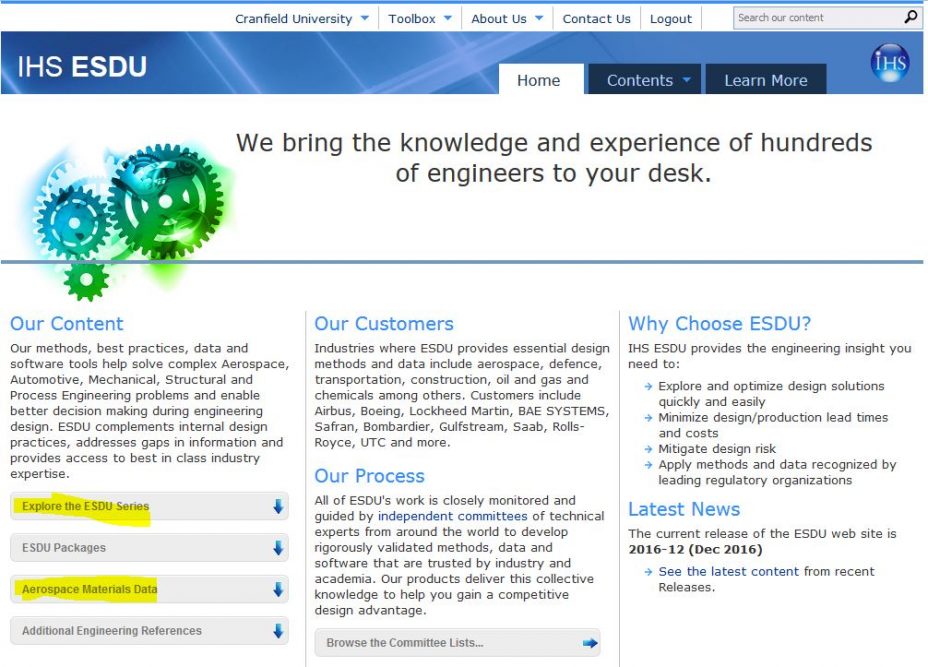ESDU – a fantastic resource for engineers!
07/12/2016

This is the first of a series of blog posts in which we will highlight some of our more specialist resources for engineers.
This one is all about ESDU. If you’re the kind of person who needs to find out how to calculate the strength of lugs under oblique load, or the lift-curve slope of swept and tapered wings, ESDU is the resource for you. It really is one of our ‘hidden gems’. It’s one of my favourite resources as it has helped me answer many tricky enquiries, and it gets such a great response when customers find the solution to their engineering design problem on it.
When I first started my Cranfield working life in the Kings Norton Library, ESDU stood for ‘Engineering Sciences Data Unit’ and comprised thousands of ‘data sheets’ which were filed away in hundreds of ring binders. Each time there was an update to a data sheet, ESDU sent us a new one and we would laboriously find the old version, throw it out and replace it with the new. Thankfully times have moved on and the service is now available online and is always up to date.
It contains fantastic information for engineers that really isn’t available elsewhere, and certainly not for free via a Google search. It’s a great place to go if you have an engineering problem that you want to solve, and it can save you lots of time and research by providing methods, worked examples and data. Its work is overseen by independent committees of technical experts (some of whom work at Cranfield), and is endorsed by the Royal Aeronautical Society, the Institution of Mechanical Engineers and the Institution of Chemical Engineers.
It contains equations, interactive graphs and software organised into 18 series. Experience has shown me that the best way to find what you need is to select the ‘Explore the ESDU series’ option and then browse to the information that you need.

‘Explore the ESDU Series’ and ‘Aerospace Materials Data’ options highlighted on the ESDU home page
The series are: aerodyamics, aircraft noise, composites, dynamics, fatigue – endurance data, fatigue – fracture mechanics, fluid mechanics (internal flow), fluid mechanics (internal flow – aerospace), heat transfer, mechanisms, performance, phyiscal data (chemical engineering), stress and strength, structures, transonic aerodynamics, tribology, vibration and acoustic fatigue and wind engineering.
Alongside the data sheets is another handy resource. The Metallic Materials Data Handbook (MMDH) can be found behind the ‘Aerospace Materials Data’ link and is a great source of metals property data for aerospace engineers, bringing lots of information that has been evaluated and meets design requirements together in one place.
ESDU itself provides videos and help and I am always happy to advise you and answer your questions. Contact me at e.turner@cranfield.ac.uk.
Public domain image from Unsplash.com
Categories & Tags:
Leave a comment on this post:
You might also like…
Setting up a shared group folder in a reference manager
Many of our students are now busy working on their group projects. One easy way to share references amongst a group is to set up group folders in a reference manager like Mendeley or Zotero. ...
Company codes – CUSIP, SEDOL, ISIN…. What do they mean and how can you use them in our Library resources?
As you use our many finance resources, you will probably notice unique company identifiers which may be codes or symbols. It is worth spending some time getting to know what these are and which resources ...
Supporting careers in defence through specialist education
As a materials engineer by background, I have always been drawn to fields where technical expertise directly shapes real‑world outcomes. Few sectors exemplify this better than defence. Engineering careers in defence sit at the ...
What being a woman in STEM means to me
STEM is both a way of thinking and a practical toolkit. It sharpens reasoning and equips us to turn ideas into solutions with measurable impact. For me, STEM has never been only about acquiring ...
A woman’s experience in environmental science within defence
When I stepped into the gates of the Defence Academy it was the 30th September 2019. I did not know at the time that this would be the beginning of a long journey as ...
Working on your group project? We can help!
When undertaking a group project, typically you'll need to investigate a topic, decide on a methodology for your investigation, gather and collate information and data, share your findings with each other, and then formally report ...






